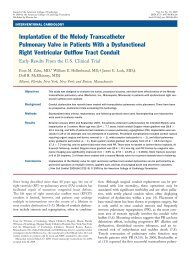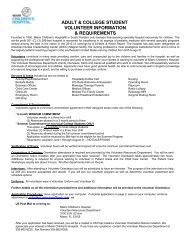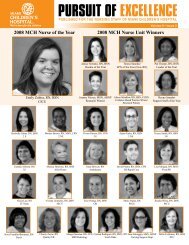Looking beyond the horizon - Miami Children's Hospital Foundation
Looking beyond the horizon - Miami Children's Hospital Foundation
Looking beyond the horizon - Miami Children's Hospital Foundation
You also want an ePaper? Increase the reach of your titles
YUMPU automatically turns print PDFs into web optimized ePapers that Google loves.
<strong>Looking</strong> ahead with advanced research.‘Smart’ Brain implants andimplantable heart valvesThe future of medicine is happening now at<strong>Miami</strong> Children’s thanks to new treatmentsbeing developed through <strong>the</strong> hospital’sresearch institute. 2007 was a standoutyear as <strong>the</strong> hospital brought to life improvedinterventions for those children struggling withchronic conditions ranging from congenitalheart disease to chronic brain disorders.“<strong>Miami</strong> Children’s <strong>Hospital</strong> is one of <strong>the</strong> largestproviders of top quality pediatric medicalresearch in <strong>the</strong> region,” said Chief ResearchOfficer Raul Herrera, MD, who was appointedto lead <strong>the</strong> <strong>Miami</strong> Children’s <strong>Hospital</strong> ResearchInstitute in 2007. The institute, including itsClinical Research Center, is currently activein more than 150 research protocols with acontract value of more than $12 million.“I am proud of <strong>the</strong> commitment of our doctors toimproving <strong>the</strong> lives of children and <strong>the</strong>ir familiesthrough leadership in academic, clinical andtranslational research,” said Dr. Herrera.2007 Highlights:‘Smart’ Brain ImplantsWhat sounds like a futuristic fantasy is fastbecoming reality for children with chronicbrain conditions. Continuing its nationalleadership, <strong>Miami</strong> Children’s Brain Institutehas established a Smart Brain Implants Centerto begin development of minimally invasiveneurosurgery procedures to treat childrenwith chronic conditions such as epilepsy,movement disorders and severe depression.The procedures, to be offered starting in 2008,will involve placement of tiny implant devicescapable of modifying adverse brain activity.“We are working with our university affiliatesOur philosophy has always been to minimize <strong>the</strong>cumulative trauma that our young patients mustendure over <strong>the</strong> course of <strong>the</strong>ir lifetime.— Dr. Evan Zahn, MD,Chief of Cardiology, The Congenital Heart Instituteand industry partners to create new hopefor children with debilitating brain disorders,”said Dr Prasanna Jayakar, Chairman of<strong>the</strong> Brain Institute. “The smart implantsapply minute electrical pulses to specificareas in <strong>the</strong> brain, acting as miniaturizedpacemakers that ease <strong>the</strong> abnormal firing ofbrain networks to alleviate symptoms. Thepacemaker is activated only when a smartmicrochip detects impending abnormal brainfiring, a novel approach with unparalleledefficacy and safety that offers great promiseto improve <strong>the</strong> lives of our children,” he said.Minimally Invasive HeartValve ReplacementThe Congenital Heart Institute at <strong>Miami</strong>Children’s <strong>Hospital</strong> was one of only threepediatric heart centers nationwide – and <strong>the</strong>only center in <strong>the</strong> Sou<strong>the</strong>ast – to participatein a study to evaluate use of a first-of-itskindheart valve replacement system thatcan be delivered to pediatric patients withoutinvasive open-heart surgery. Typically,children with congenital valve defects mustundergo multiple open-heart surgeriesover a lifetime as replacement valves areoutgrown or wear out. “Our philosophy hasalways been to minimize <strong>the</strong> cumulativetrauma that our young patients must endureover <strong>the</strong> course of <strong>the</strong>ir lifetime. This new,non-surgical method of valve replacementis a quantum leap forward toward achievingthis goal,” said Dr. Evan Zahn, <strong>the</strong> hospital’sprincipal investigator in <strong>the</strong> study to evaluateuse of <strong>the</strong> Medtronic Melody Transca<strong>the</strong>terPulmonary Valve and EnsembleTransca<strong>the</strong>ter Delivery System.Improving Lives of Childrenwith Scoliosis and LimbDeformities<strong>Miami</strong> Children’s <strong>Hospital</strong>’s Department ofOrthopaedics plays a leading national andinternational role in developing and refiningtreatments for children with scoliosis andlimb deformities. Dr. Harry L. Shufflebarger,head of <strong>the</strong> department’s Spinal SurgeryDivision, conducts ongoing research tooptimize surgical methods associated with<strong>the</strong> use of an implantable rod for correctingspinal curvatures that he helped to developmore than a decade ago. Dr. Shufflebargershares his research findings through nationaland international conferences and haspublished more than 15 textbook chapters.Dr. Christopher Iobst, who heads <strong>the</strong>department’s Limb Correction Division, was<strong>the</strong> recipient of <strong>the</strong> 2007 St. Giles YoungInvestigator Award presented by <strong>the</strong> PediatricOrthopaedic Society of North America forhis national research leadership. The awardrecognizes young physicians who are dedicatedto conducting research to benefit orthopaedicpatients. Dr. Iobst specializes in <strong>the</strong> correctionof limb length discrepancies and deformitiesand conducts research to evaluate outcomesassociated with <strong>the</strong> latest techniques.Research1415
















